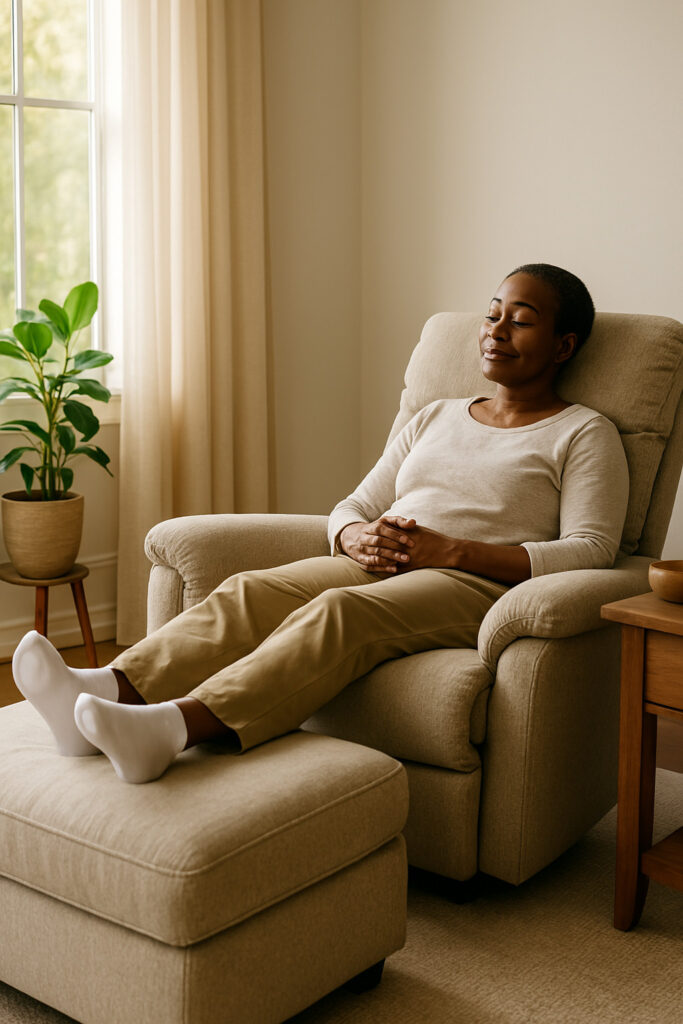Varicose veins are a common condition affecting millions of people worldwide. These twisted, enlarged veins typically appear in the legs and are caused by weakened or damaged vein valves that allow blood to pool. While medical treatments like sclerotherapy and laser therapy are available, many individuals seek natural remedies to manage symptoms and improve circulation.
In this article, we explore 15 home remedies for varicose veins, backed by medical research and expert recommendations. These remedies can help alleviate discomfort, reduce swelling, and support overall vein health.
1. Exercise Regularly
Physical activity is one of the most effective ways to promote circulation in the legs. When you move, your leg muscles help push blood back toward the heart, reducing pooling, and slow the progression of varicose veins.
Best exercises for vein health:
- Walking
- Swimming
- Cycling
- Leg lifts & stretching
Tip: Aim for at least 30 minutes of moderate exercise most days of the week.
🔗 Mayo Clinic on varicose vein prevention
2. Elevate Your Legs
Keeping your legs elevated above heart level for 15–20 minutes a few times a day can improve circulation and reduce swelling. Gravity assists in draining excess blood and fluid from your legs, easing pressure on your veins.
Tip: Prop your legs on pillows while lying down or rest them on a footstool when sitting.
🔗 Stanford Health Care on leg elevation
3. Wear Compression Stockings
Compression stockings apply gentle pressure to your legs, improving blood flow and reducing swelling. They are particularly beneficial for people who stand or sit for long hours.
Tip: Choose graduated compression stockings, which provide more pressure at the ankle and gradually decrease up the leg.
🔗 Harvard Health on compression therapy
4. Maintain a Healthy Weight
Excess weight can put added pressure on your veins, making varicose veins worse. Losing weight can relieve some of the strain and help improve circulation.
Tip: Focus on a diet rich in fruits, vegetables, whole grains, and lean proteins to maintain a healthy weight.
5. Stay Hydrated
Drinking plenty of water helps keep your blood from becoming too thick, reducing strain on your veins. Dehydration can cause blood to thicken, making circulation more difficult.
Tip: Aim for at least 8 glasses of water per day, and more if you are active.
6. Eat Foods Rich in Flavonoids
Flavonoids are antioxidants found in many plant-based foods that help strengthen blood vessels, improve circulation, and reduce inflammation.
Flavonoid-rich foods:
- Berries (blueberries, strawberries, blackberries)
- Dark chocolate
- Onions
- Citrus fruits
- Spinach and kale
🔗 Cleveland Clinic on flavonoids and vein health
7. Massage Your Legs
Gently massaging your legs can help stimulate circulation and relieve discomfort. Use upward strokes from the feet to the thighs, avoiding direct pressure on varicose veins.
Tip: Use essential oils like lavender or cypress mixed with a carrier oil for added relaxation and benefits.
8. Avoid Sitting or Standing for Long Periods
Prolonged sitting or standing can worsen varicose veins by allowing blood to pool in your lower legs.
Tip: Take breaks every 30–60 minutes to move around and stretch your legs. If you work a desk job, consider a footrest to keep your legs slightly elevated.
9. Try Apple Cider Vinegar
Apple cider vinegar is believed to improve circulation and reduce swelling when applied topically.
How to use:
- Dilute apple cider vinegar with water and apply it to affected areas with a cloth.
- Massage gently for a few minutes.
🔗 WebMD on apple cider vinegar benefits
10. Take Horse Chestnut Extract
Horse chestnut seed extract is commonly used to reduce leg pain and swelling associated with varicose veins. It contains aescin, a compound that improves vein tone and reduces leakage.
Tip: Take standardized horse chestnut supplements (consult a doctor before use).
🔗 NIH on horse chestnut benefits
11. Eat More Fiber
A high-fiber diet helps prevent constipation, which can increase pressure in the veins and worsen varicose veins.
Good sources of fiber:
- Oats
- Legumes
- Whole grains
- Chia seeds
12. Avoid High-Sodium Foods
Too much sodium can lead to water retention and swelling, putting extra stress on your veins.
Tip: Reduce processed foods and opt for low-sodium alternatives when possible.
13. Use Cold Showers
Cold water causes blood vessels to constrict, which can reduce swelling and discomfort in varicose veins.
Tip: Rinse your legs with cool water at the end of a shower to improve circulation.
14. Try Herbal Remedies
Some herbal supplements may help improve vein health:
- Gotu kola: Supports vein elasticity
- Butcher’s broom: Reduces swelling and discomfort
Tip: Always consult a healthcare professional before taking herbal supplements.
15. Avoid Wearing Tight Clothing
Tight clothing, especially around the waist, thighs, or legs, can restrict circulation and worsen varicose veins.
Tip: Opt for loose, comfortable clothing to avoid unnecessary pressure on your veins.
Final Thoughts
While home remedies won’t completely eliminate varicose veins, they can reduce symptoms, improve circulation, and slow their progression. If your symptoms persist or worsen, consult a doctor about medical treatment options like sclerotherapy or laser therapy.
By incorporating these natural remedies into your daily routine, you can promote better vein health and reduce the discomfort associated with varicose veins.
Key Takeaways
✅ Exercise, leg elevation, and compression stockings improve circulation.
✅ A diet rich in fiber, flavonoids, and hydration supports vein health.
✅ Herbal supplements like horse chestnut extract may reduce swelling.
✅ Avoid prolonged sitting, tight clothing, and high-sodium foods.
If you found these tips helpful, share them with friends and family who might benefit! 😊

